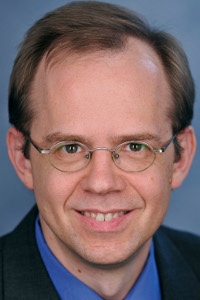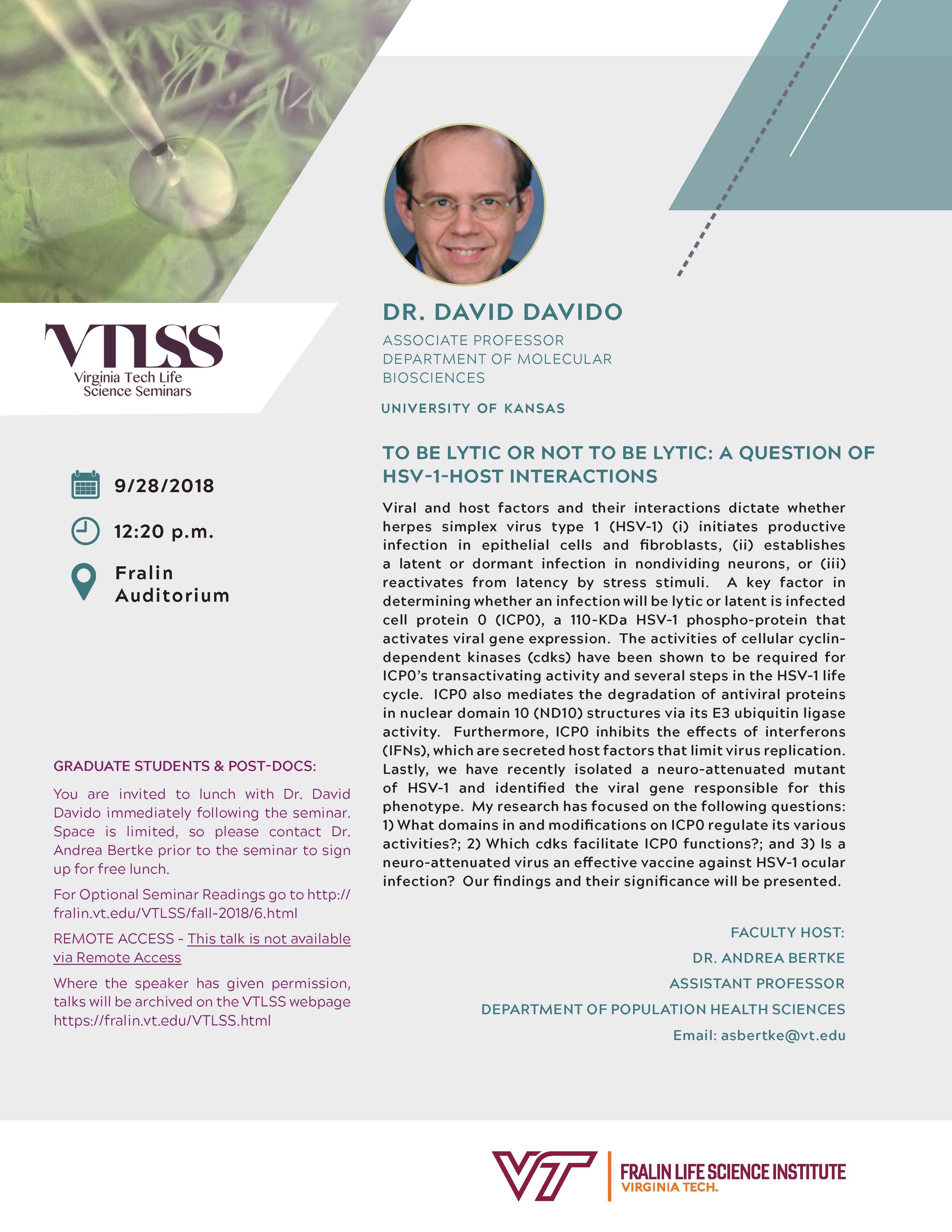To be lytic or not to be lytic: a question of HSV-1-host interactions

Dr. David Davido; University of Kansas
September 28 at 12:20pm in the Fralin Auditoriu, Fralin Hall room 102
Hosted by Andrea Bertke
David Davido obtained his Ph.D. from Washington University in St. Louis with Dr. David Leib, where he studied the regulation of HSV-1 transcription. He was a Postdoctoral Fellow at the University of Wuerzburg and then at the University of Pennsylvania and Harvard Medical School with Dr. Priscilla Schaffer. His postdoctoral studies in the Schaffer lab were to understand the role that the HSV-1 regulatory protein, ICP0, plays in stimulating viral replication. In 2005, he accepted a faculty position in the Department of Molecular Biosciences at the University of Kansas and was promoted to Associate Professor (with tenure) in 2011. His lab’s long-standing research interest is to determine the molecular mechanisms by which viral and host factors regulate the herpes simplex virus type 1 (HSV-1) life cycle, relating results from his studies to recurrent HSV diseases. He has extensive experience (~25 years) working in this area of research, which has been supported by several federally-funded grants. His published data strongly support the premise that specific cellular factors and their interactions with viral proteins and vice-versa are important determinants as to whether HSV-1 will establish a lytic or latent infection.
Viral and host factors and their interactions dictate whether herpes simplex virus type 1 (HSV-1) (i) initiates productive infection in epithelial cells and fibroblasts, (ii) establishes a latent or dormant infection in nondividing neurons, or (iii) reactivates from latency by stress stimuli. A key factor in determining whether an infection will be lytic or latent is infected cell protein 0 (ICP0), a 110-KDa HSV-1 phospho-protein that activates viral gene expression. The activities of cellular cyclin-dependent kinases (cdks) have been shown to be required for ICP0’s transactivating activity and several steps in the HSV-1 life cycle. ICP0 also mediates the degradation of antiviral proteins in nuclear domain 10 (ND10) structures via its E3 ubiquitin ligase activity. Furthermore, ICP0 inhibits the effects of interferons (IFNs), which are secreted host factors that limit virus replication. Lastly, we have recently isolated a neuro-attenuated mutant of HSV-1 and identified the viral gene responsible for this phenotype. My research has focused on the following questions: 1) What domains in and modifications on ICP0 regulate its various activities?; 2) Which cdks facilitate ICP0 functions?; and 3) Is a neuro-attenuated virus an effective vaccine against HSV-1 ocular infection? Our findings and their significance will be presented.
HSV-1 ICP0: An E3 Ubiquitin Ligase That Counteracts Host Intrinsic and Innate Immunity.
Lanfranca MP, Mostafa HH, Davido DJ.
Cells. 2014 May 20;3(2):438-54. doi: 10.3390/cells3020438.
Fowler AM, Shinogle HE, Davido DJ.
Antiviral Res. 2015 Aug;120:1-6. doi: 10.1016/j.antiviral.2015.04.012. Epub 2015 Apr 30
Davido DJ, Tu EM, Wang H, Korom M, Gazquez Casals A, Reddy PJ, Mostafa HH, Combs B, Haenchen SD, Morrison LA.
J Virol. 2018 Jun 27. pii: JVI.01036-18. doi: 10.1128/JVI.01036-18. [Epub ahead of print]

This seminar will NOT be livestreamed or recorded.


